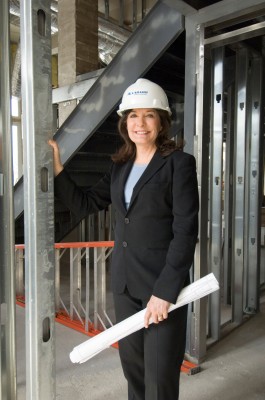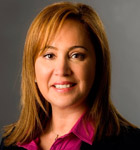
When Linda Alvarado was growing up in Albuquerque, New Mexico, her parents instilled in her the importance of teamwork. The only sister to five older brothers, Alvarado was encouraged to excel in sports, church, and academics. “When you have six kids, you have a team,” she notes. “My father played recreational baseball and would let me sweep the home plate between innings.” In high school, Alvarado was a catcher on the softball team and president of the girls’ sports club. “Ultimately, growing up with five brothers made me comfortable working in male-dominated fields.”
Alvarado’s mother motivated her to study. “In art class, I wasn’t drawing flowers or painting sunsets,” she recalls. “I was drawing buildings, bridges, and skyscrapers.” Meanwhile, Alvarado’s father indirectly played a part in steering her toward a career in construction. “I helped my dad hand mix and pour concrete for our backyard porch and storage shed,” she says.
When Alvarado was in college in Southern California, she took a summer job as an administrative assistant to a developer. Design, architecture, and the creative process enamored the only female on the construction site. “As a child, I built with my brothers, but not anything of this magnitude. I started dreaming that maybe I could build concrete structures.”
Determined to launch a successful career as a contractor, Alvarado defied stereotypes attached to women and Hispanics. “Not only was construction just for guys, it was just for big, burly guys,” she explains. “Women often talk about a ‘glass ceiling,’ through which they can clearly see where they want to go. In my case, it was a concrete ceiling. I couldn’t see any other women where I was going.” Her biggest challenge was gaining access to capital, and eventually her parents mortgaged their small adobe house in New Mexico to get her started. “It was a loan that I paid back, but I could never repay my parents for their belief in me when other people were challenging my ability to succeed.”
Thinking Out Loud
Trading words with Linda Alvarado
Success
Start small, but think big. All big businesses were once small businesses.
Innovation
Take risks. You’ll never get to second base if you keep your foot safely on first.
Integrity
I’d rather be short on cash than short of character.
Latino
Working together we succeed
Today, Alvarado Construction, Inc. is one of the fastest-growing commercial general contractors in the United States. Having completed industrial, transportation, and technology projects for Fortune 500 companies, one particular job that stands out in Alvarado’s memory was accomplished in 2008. Alvarado Construction was the lead construction manager in charge of remodeling and restoration of Denver’s Pepsi Center for the Democratic National Convention. With six weeks to convert the sports arena, Alvarado’s team removed 5,000 seats; opened the ceiling; added lighting and structural work; built an additional 164,000 square feet of office space with HVAC, security, electrical, and data/phone lines; and transformed suites into broadcast booths for international print, radio, and television media. “Who would have ever thought that this skinny little girl from New Mexico could one day accomplish a high-profile project of this magnitude?” Alvarado says.
In addition to Alvarado’s remarkable success in the construction and development industries, she is active in several nonprofit and community foundations. Moreover, she’s one of the original owners of the MLB Colorado Rockies. “Baseball’s positive influence over the Latino community is one of the reasons I was attracted to it,” explains Alvarado. Bringing major league baseball to Denver in the early 1990s was a huge accomplishment for Alvarado and Hispanic athletes. In fact, Alvarado was the first Hispanic—man or woman—to ever own a Major League Baseball team, and she was also the first female entrepreneur to bring her own capital to a major league franchise.
“In baseball, not one Latino on the field is playing just because he’s Hispanic,” she notes. “Latinos have opportunities in baseball that perhaps we haven’t had access to in education, employment, and capital,” she explains. “In baseball, the rules are the same in every field for everyone. The bases are always the same distance apart, and even when you strike out you get another turn at bat,” she says. “It demonstrates that when Hispanics have the opportunity on a level playing field, in any endeavor, we can succeed.”

